Related Research Articles

Thomas Becket, also known as Saint Thomas of Canterbury, Thomas of London and later Thomas à Becket, served as Lord Chancellor from 1155 to 1162, and then as Archbishop of Canterbury from 1162 until his death in 1170. He engaged in conflict with Henry II, King of England, over the rights and privileges of the Church and was murdered by followers of the King in Canterbury Cathedral. Soon after his death, he was canonised by Pope Alexander III. He is venerated as a saint and martyr by the Catholic Church and the Anglican Communion.
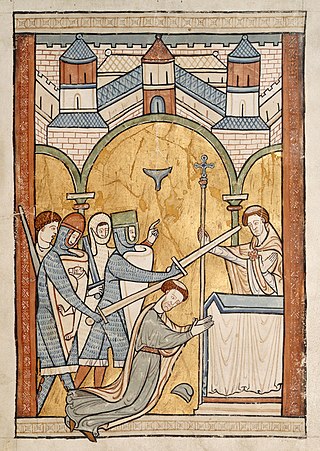
Sir Richard le Breton or Richard de Brito was one of the four knights who in 1170 murdered Thomas Becket, Archbishop of Canterbury.

Murder in the Cathedral is a verse drama by T. S. Eliot, first performed in 1935. The play portrays the assassination of Archbishop Thomas Becket in Canterbury Cathedral during the reign of Henry II in 1170. Eliot drew heavily on the writing of Edward Grim, a clerk who was an eyewitness to the event.
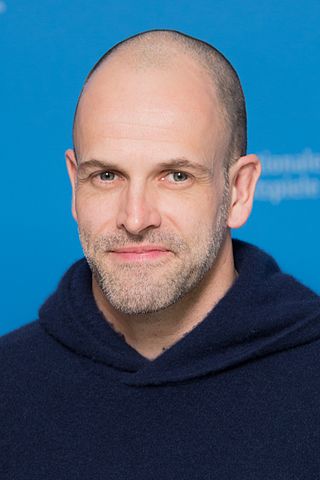
Jonathan Lee Miller is an English actor. He achieved early success for his portrayal of Simon "Sick Boy" Williamson in the dark comedy-drama film Trainspotting (1996) and as Dade Murphy in Hackers (1995) before earning further critical recognition for his performances in Afterglow (1997), Mansfield Park (1999), Mindhunters (2004), The Flying Scotsman (2006), Endgame (2009), and T2 Trainspotting (2017). For The Flying Scotsman he received a London Film Critics' Circle nomination for Actor of the Year. He was also part of the principal cast in the films Melinda and Melinda (2004), Dark Shadows (2012), and Byzantium (2013). He has appeared in several theatrical productions, most notably After Miss Julie and Frankenstein, the latter of which earned him an Olivier Award for Best Actor.

Knaresborough is a market and spa town and civil parish on the River Nidd in North Yorkshire, England. It is three miles east of Harrogate and was in the Borough of Harrogate until April 2023.

James Brian Mark Purefoy is an English actor. He played Mark Antony in the HBO series Rome, Nick Jenkins in A Dance to the Music of Time, college professor turned serial killer Joe Carroll in the series The Following, Solomon Kane in the film of the same name, and Hap Collins in the Sundance series Hap and Leonard. Purefoy also played Lord Phillipe de Clermont in the second season of the hit AMC/Netflix series "A Discovery of Witches". In 2018, he starred as Laurens Bancroft in the first season of Altered Carbon, a Netflix original series. Following an uncredited role as V in the 2006 film V for Vendetta, he was cast in a main role as Captain Gulliver "Gully" Troy / Captain Blighty in the 2020–2021 second and 2022 third season of the television series Pennyworth, the prequel to both Gotham and V for Vendetta.

The Kiln Theatre is a theatre located in Kilburn, in the London Borough of Brent, England. Since 1980, the theatre has presented a wide range of plays reflecting the cultural diversity of the area, as well as new writing, political work and verbatim reconstructions of public inquiries.

Sir William de Tracy was a knight and the feudal baron of Bradninch, Devon, with caput at the manor of Bradninch near Exeter, and was lord of the manors of Toddington, Gloucestershire and of Moretonhampstead, Devon. He is notorious as one of the four knights who assassinated Thomas Becket, Archbishop of Canterbury, in December 1170.

Nick Moran is an English actor and filmmaker. His roles include Eddie the card sharp in Lock, Stock and Two Smoking Barrels and as Scabior in Harry Potter and the Deathly Hallows – Part 1 and Part 2.
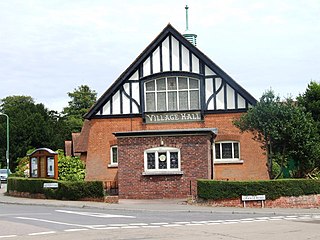
Saltwood is a village and civil parish in the Folkestone and Hythe District of Kent, England. Within the parish are the small hamlets of Pedlinge and Sandling.
Lee Williams is a British actor, Voice Over artist, director, screenwriter and former model from Bangor, Wales.

Sir Reginald FitzUrse (1145–1173) was one of the four knights who murdered Thomas Becket in 1170. His name is derived from Fitz, the Anglo-Norman French term meaning "son of" and urse meaning a bear, likely the nom de guerre of an ancestor. Although he lived before the true age of heraldry, which developed in the early 13th century, his shield bore the cognizance of a bear, which is visible in a contemporary drawing portraying the murder of Becket.

Sir Hugh de Morville was an Anglo-Norman knight who served King Henry II of England in the late 12th century. He is chiefly famous as one of the assassins of Thomas Becket, Archbishop of Canterbury in 1170. He held the title Lord of Westmorland and of Knaresborough; his father was Hugh de Morville, Constable of Scotland.
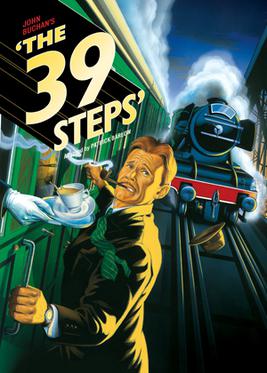
The 39 Steps is a parody play adapted from the 1915 novel by John Buchan and the 1935 film by Alfred Hitchcock. The original concept and production of a four-actor version of the story was written by Simon Corble and Nobby Dimon, and premiered in 1996. Patrick Barlow rewrote this adaptation in 2005.
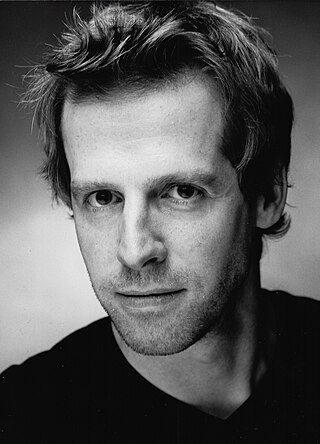
Sean Kane is a Scottish actor born in Peebles. He trained in Acting at Edinburgh’s Queen Margaret University.
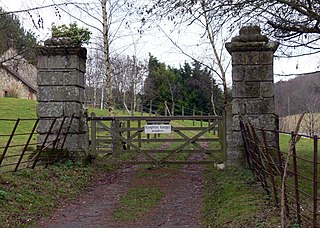
Knighton Gorges Manor was one of the grandest manor houses on the Isle of Wight, located in the hamlet of Knighton, near Newchurch.
Paul Miller was the artistic director of the Orange Tree Theatre in Richmond, London from 2014 to 2022, succeeding the theatre's founder, Sam Walters.
Ranulf de Broc was an Anglo-Norman nobleman and royal official during the reign of King Henry II of England. He held two offices in the royal household as well as performing other administrative duties for the king. During the Becket controversy between King Henry and Thomas Becket, the Archbishop of Canterbury, de Broc supported the king and was granted the administration of the exiled archbishop's lands during the later half of the 1160s. This earned de Broc three sentences of excommunication from the archbishop because of de Broc's financial exactions from the estates. De Broc was with the four men who murdered Becket in December 1170, although he did not take part in the actual murder. At de Broc's death around 1179, he left behind a widow and five daughters, who were his co-heiresses.

"Will no one rid me of this turbulent priest?" is a quote attributed to Henry II of England preceding the death of Thomas Becket, the Archbishop of Canterbury, in 1170. While the quote was not expressed as an order, it prompted four knights to travel from Normandy to Canterbury, where they killed Becket due to an ongoing dispute between crown and church. The phrase is commonly used in modern-day contexts to express that a ruler's wish may be interpreted as a command by his or her subordinates. It is also commonly understood as shorthand for any rhetorical device allowing leaders to covertly order or exhort violence among their followers, while still being able to claim plausible deniability for political, legal, or other reasons.
Paul Webb is a British screenwriter and playwright. Following careers as a teacher in Reading, Berkshire, and as a consultant in the petrochemical industry, he later moved into writing. He is known for writing the screenplay of the 2014 film Selma. For his work in Selma, Webb won the Central Ohio Film Critics Association Award for Best Original Screenplay. Webb was also nominated for the Satellite Award for Best Original Screenplay for his work in Selma, which he lost to Dan Gilroy for Nightcrawler. In addition to Selma, Webb also served as one of the writers for the 2017 BET miniseries Madiba.
References
- 1 2 3 4 Billington, Michael (11 November 1999). "Look back in rancour (review of premiere)". The Guardian . London. Retrieved 22 May 2007.
- 1 2 3 4 5 "Doubting castle (review of premiere)". The Times . London. Archived from the original on 5 May 2013. Retrieved 22 May 2007.
- 1 2 "McGuigan to shoot 'Four Knights'". Time Out, London. Archived from the original on 10 June 2007. Retrieved 22 May 2007.
- 1 2 Malvern, Jack (10 June 2006). "Hollywood shines a light on geezers who killed à Becket". The Times . London. Archived from the original on 10 June 2010. Retrieved 22 May 2007.
- 1 2 3 4 5 "Four Nights in Knaresborough (review of Riverside production)". Online Review, London. Retrieved 22 May 2007.
- ↑ "Four Nights in Knaresborough (review of UK tour)". WhatsOnStage.com. Archived from the original on 30 September 2007. Retrieved 22 May 2007.
- 1 2 "Paul Webb (Playwright & Screenwriter)". PFD. Archived from the original on 10 February 2007. Retrieved 22 May 2007.
- ↑ "Actors angry as admin eats theatre cash". The Independent . London. 20 February 2000. Archived from the original on 30 September 2007. Retrieved 22 May 2007.
- ↑ "Production listing (UK tour)". WhatsOnStage.com. Retrieved 22 May 2007.
- ↑ "Four Nights in Knaresborough (review of Traverse production)". The British Theatre Guide. Retrieved 22 May 2007.
- ↑ "Four Nights in Knaresborough (review of Riverside production)". The British Theatre Guide. Retrieved 22 May 2007.
- ↑ "Four Nights in Knaresborough (review of Riverside production)". MusicOHM.com. Retrieved 22 May 2007.
- ↑ Gardner, Lyn (29 March 2005). "Four Nights in Knaresborough (review of Riverside production)". The Guardian . London. Retrieved 22 May 2007.
- ↑ "Four Nights in Knaresborough (review of Burton Taylor production)". The Oxford Student. Archived from the original on 11 December 2006. Retrieved 22 May 2007.
- ↑ "Four Nights in Knaresborough (review of Burton Taylor production)". BBC Oxford. Retrieved 22 May 2007.
- ↑ Gardner, Chris (12 June 2006). "McGuigan counts on 'Four'". Variety . Retrieved 30 May 2007.